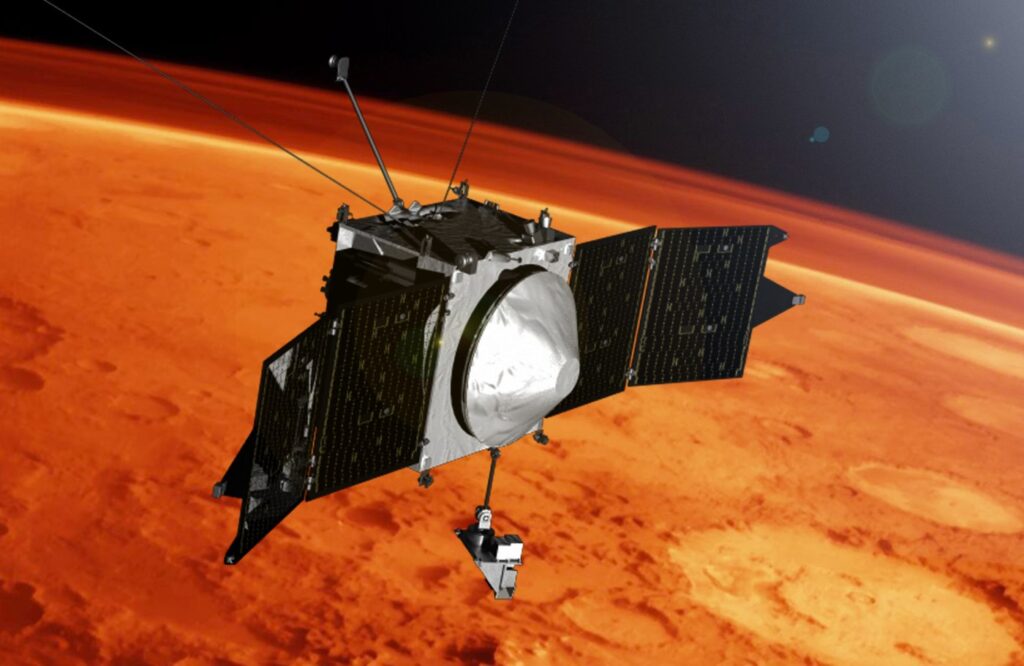Three NASA space missions, including the Mars Atmospheric and Volatile EvolutioN (MAVEN) mission led by the University of Colorado Boulder, face potential cancellation as part of sweeping budget cuts proposed by the Trump administration. The administration’s budget suggests a 47% reduction in NASA’s science budget for the next fiscal year, with MAVEN among the missions targeted for termination effective October 1.
MAVEN, which began its orbit around Mars in September 2014, has been instrumental in collecting data on the Martian atmosphere. CU Boulder professor and MAVEN principal investigator Shannon Curry expressed deep concern over the proposed cuts. “The team and I are devastated, and not just on a personal level,” Curry said. “When you think about what canceling MAVEN does to the larger Mars program and America’s preeminence in space exploration, it’s really bad.”
Impact on CU Boulder and Space Exploration
The potential cancellation of these missions is part of the “Big Beautiful Bill” currently under congressional consideration. The U.S. Senate narrowly approved the bill, which now returns to the House for further deliberation. At CU Boulder, at least 150 individuals, including professors, students, and engineers, are engaged in the MAVEN mission.
“This expertise takes years, if not decades, to grow and to create these kinds of teams,” Curry noted. “Dismantling them now is a hit not just to CU but to NASA’s preeminence in space exploration and their leadership, especially in the Mars exploration program.”
MAVEN is America’s No. 1 telecommunications relay to send data back from Mars. Canceling MAVEN would mean relying on Russia and Europe for data downlink.
Broader Implications for NASA Missions
The budget proposal also seeks to cancel NASA’s Magnetospheric Multiscale Mission and the Juno spacecraft orbiting Jupiter, both supported by CU Boulder teams. The Magnetospheric Multiscale Mission is crucial for understanding space weather, while the Juno spacecraft has been pivotal in studying Jupiter since 2016.
David Brain, chair of the astrophysical and planetary sciences department at CU Boulder, expressed concern about the long-term implications for science and the scientist pipeline in the U.S. “It’s these early career scientists that many of us on the faculty are most concerned about,” Brain said. “They’ll be in my position or my colleagues’ positions 15 to 20 years from now.”
NASA contracts in Colorado generated over $5 billion in economic activity in fiscal year 2023, supporting 21,600 jobs and contributing $190 million in state tax revenue.
Economic and Scientific Ramifications
The proposed cuts could have significant economic repercussions for Colorado, a state with a robust aerospace industry. In 2024, Colorado received $26 billion in federal aerospace funding, supporting over 55,000 direct jobs and indirectly employing another 184,000 Coloradans.
“Having cuts this large has the potential to severely limit the amount of scientific progress we can make in the U.S.,” Brain emphasized. “At a time when there are people and scientists all over the world who are trying to make progress, the U.S. will be ceding leadership in this area if these cuts go through and are sustained.”
The uncertainty surrounding the future of these missions is compounded by the absence of NASA’s annual ROSES report, which solicits research proposals. This delay has heightened concerns among scientists about missing out on a year of funding opportunities, potentially affecting future research endeavors.
As the House prepares to reconsider the budget, the scientific community remains on edge, hoping for a resolution that will preserve America’s leadership in space exploration and protect the livelihoods of those dedicated to advancing our understanding of the universe.
